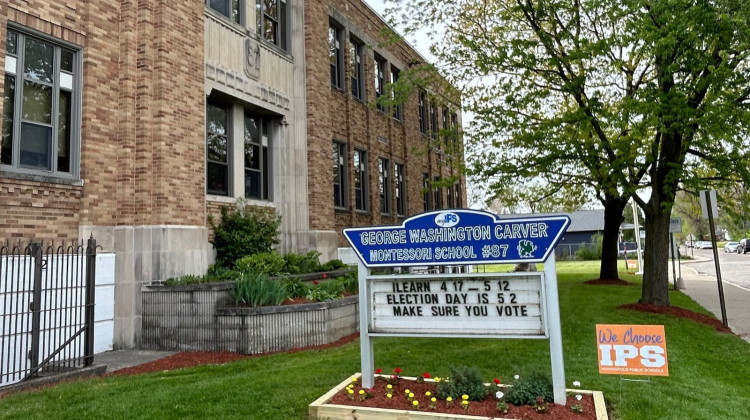
In November 2018 voters overwhelmingly approved a $272 million property-tax referendum to boost funding at Indianapolis Public Schools.
(WFYI file photo)Leaders of Indianapolis Public Schools may decide to share funds from their 2018 property-tax referendum with the independently managed schools in the district. The proposal would provide a total of roughly $5 million to the schools for each year until 2026 to help fund teacher salaries and other classroom expenses.
Most independent IPS schools are known as innovation charter schools. Even though they are considered part of the district, they currently do not directly receive referendum or other property-tax revenue. That has led to a funding gap between the district’s traditional schools and its growing network of charter and autonomously managed schools.
But a district proposal could make the gap smaller.
IPS Superintendent Aleesia Johnson is recommending these schools receive an additional $500 per student from the district’s referendum revenue. For a school to receive the funding, an enrolled student must reside in the IPS district.
If approved, around 10,000 students at 25 schools would receive these funds, according to a district presentation Tuesday during the IPS Board of Commissioners public work session. Johnson said the district will strongly encourage innovation charter schools to allocate some of the money to teacher and staff salary raises.
In total, the district would allocate an additional $5 million in total to innovation schools each year until the referendum ends in 2026.
Johnson said this is a step toward creating a more equitable district. Nearly 70 percent of students in IPS qualify for free or reduced meals.
"We'll continue to have to navigate that pressure that we know we feel for the long term fiscal sustainability of the district, even as we make a decision that we believe demonstrates an investment in our students, an investment in all the grownups who are serving IPS students," Johnson said.
The recommendation comes as students and parents at innovation charter schools advocated during the past two years for the district to share the referendum dollars. Leaders of these schools also voiced impatience with the process.
In November 2018, voters approved two parts of the eight-year referendum: $220 million for general operating expenses and $52 million in capital improvements, which pays for building infrastructure and security upgrades.
IPS innovation schools located within a district facility have received some of the capital referendum funding, and benefit from some in-kind services such as district-provided facilities, transportation and other services.
But these schools have historically been excluded from the operating referendum funds, which have been used to increase teacher pay for educators who are part of the district's collective bargaining agreement. Innovation charter school teachers are not covered under the contract between the district and union, and do not receive the same compensation increases.
Those differences have caused a funding gap of 21 percent, or $2,694, between the per-pupil funding traditional IPS districts schools receive compared to most IPS innovation schools. The gap shrinks once adjusted for in-kind services the district provides to innovation partner schools, such as transportation. The funding difference then spans from 10.4 percent, or $1,453, to 2.3 percent, or $352, in per-pupil funding, according to a district analysis.
Brandon Brown, CEO of local education reform group The Mind Trust, said the district’s consideration to share the funding is an indication IPS leaders are serious about racial equity commitments. Most innovation schools are launched from Mind Trust programs or with its financial and logistical support.
“In my estimation, this strikes the right balance and is a prudent decision that gets the district closer to funding equity, but also preserves the long term financial stability of the system,” Brown said before the meeting.“So while this might not be true equity, it is a step in the right direction and I think does an excellent job of trying to balance competing priorities.”
The IPS board of school commissioners will vote on sharing the referendum funding during their action session next week. The board meets Nov. 16 and 18.
Contact WFYI education reporter Elizabeth Gabriel at egabriel@wfyi.org. Follow on Twitter: @_elizabethgabs.
 DONATE
DONATE






 Support WFYI. We can't do it without you.
Support WFYI. We can't do it without you.